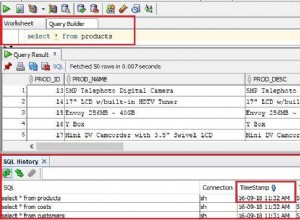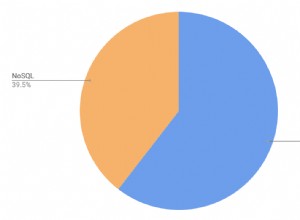Comme solution de contournement du problème, nous pouvons également SELECT un alias pour la colonne utilisée à PARTITION BY expression. Ensuite, PG applique l'optimisation et utilise l'index.
La réponse à la question pourrait être :PG n'applique pas l'optimisation si le type composite est utilisé . Remarquez que cela fonctionne :
PARTITION | FILTER | IS USED?
------------------------------
ALIAS | ORIG | NO
ALIAS | ALIAS | YES
ORIG | ALIAS | NO
ORIG | ORIG | NO
Voir ce dbfiddle
create table agreement ( ag_id int, name text, cost numeric(10,2) );
create index ag_idx on agreement (ag_id);
insert into agreement (ag_id, name, cost) values ( 1, '333', 22 ),
(1,'333', 33), (1, '333', 7), (2, '555', 18 ), (2, '555', 2), (3, '777', 4);
select * from agreement;
create function initial ()
returns table( agreement_id int, ag agreement ) language sql stable AS $$
select ag_id, t from agreement t;
$$;
select * from initial() t;
explain( analyze, costs, buffers, verbose ) with totals_by_ag as (
select
*,
sum( (t.ag).cost ) over ( partition by agreement_id ) as total
from initial() t
)
select * from totals_by_ag t
where (t.ag).ag_id = 1; -- index is NOT USED
explain( analyze, costs, buffers, verbose ) with totals_by_ag as (
select
*,
sum( (t.ag).cost ) over ( partition by agreement_id ) as total
from initial() t
)
select * from totals_by_ag t
where agreement_id = 1; -- index is used when alias for column is used
explain( analyze, costs, buffers, verbose ) with totals_by_ag as (
select
*,
sum( (t.ag).cost ) over ( partition by (t.ag).ag_id ) as total --renamed
from initial() t
)
select * from totals_by_ag t
where agreement_id = 1; -- index is NOT USED because grouping by original column
explain( analyze, costs, buffers, verbose ) with totals_by_ag as (
select
*,
sum( (t.ag).cost ) over ( partition by (t.ag).ag_id ) as total --renamed
from initial() t
)
select * from totals_by_ag t
where (t.ag).ag_id = 1; -- index is NOT USED even if at both cases original column




